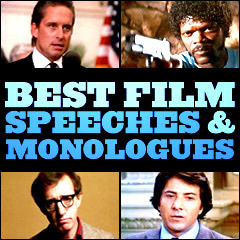|
Best Film Speeches and Monologues
|
|
Title Screen
|
Film Title/Year and Description of Film Speech/Monologue |
Screenshots
|

|
Bananas
(1971)
Screenwriter(s): Woody Allen, Mickey Rose
 Inappropriate
Fundraising "Keynote Speech" Inappropriate
Fundraising "Keynote Speech"
In Woody Allen's irreverent, and slapstick political
satire, Fielding Mellish (Woody Allen), as accidental leader
of the tiny (fictional) Central American island nation of San
Marcos, delivered a stuttering, outrageously inappropriate
keynote speech at a high society fundraiser:
Although the United States is, uh, a very
rich country and San Marcos is a very poor one, there are
a great many things we have to offer your country in return
for aid. For instance, there, uh, there are locusts. Uh,
we have more locusts than...uh, locusts of all races and
creeds. These, these locusts, incidentally, are available
at popular prices. And so, by the way, are most of the
women of San Marcos...despite the tiny size of our nation,
few people realize that we lead the world in hernias. They
also fail to realize that before Columbus discovered your
country, he stopped in San Marcos and contracted a disease
which today can be cured with one shot of penicillin...
|

|
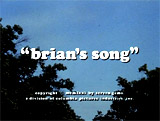
|
Brian's
Song (1971)
Screenwriter(s): William Blinn
 Locker
Room Address Locker
Room Address
Play clip (excerpt): 
Gale Sayers' (Billy Dee Williams) haltingly spoken
locker-room address to his fellow players on Brian Piccolo's
(James Caan) cancer, breaking down into uncontrollable sobs
that caused him to prematurely end his speech:
Uhm, you uh, all know that we hand out a
game ball to the outstanding player. Well, I'd like to
change that. We just got word that Brian Piccolo is - that's
he's sick, very sick. And, uh, it looks like, uhm, he might
never play football again, or, uh, a long time. And, I
think we should dedicate ourselves to, uh, give our maximum
effort to win this game and give the game ball to 'Pic'.
We can all sign it. And take it up. Aw, sh -- Oh, my God
|
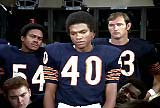
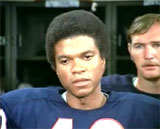
|

|
Brian's
Song (1971)
Screenwriter(s): William Blinn
 Award
Acceptance Speech Award
Acceptance Speech
Play clip (excerpt): 
Gale Sayers' tear-jerking acceptance speech
for the George S. Halas Award for Courage:
I'd like to say a few words about a guy
I know, a friend of mine. His name is Brian Piccolo, and
he has the heart of a giant and that rare form of courage
which allows him to kid himself and his opponent - cancer.
He has a mental attitude which makes me proud to have a
friend who spells out 'courage' 24 hours a day every day
of his life. Now you flatter me by giving me this award.
But I say to you here and now, Brian Piccolo is the man
of courage who should receive the George S. Halas award.
It's mine tonight and Brian Piccolo's tomorrow. I love
Brian Piccolo. And I'd like all of you to love him, too.
And tonight, (when) you hit your knees - please ask God
to love him.
|
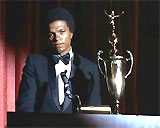
|

|
Carnal
Knowledge (1971)
Screenwriter(s): Jules Feiffer
 "It's
Up, in the Air!" "It's
Up, in the Air!"
Play clip (excerpt): 
The reassuring speech of paid prostitute Louise
(Rita Moreno in a cameo) to massage dysfunctionally-impotent
Jonathan's (Jack Nicholson) ego (and more) in the film's final
scene. Obsessively, he had her recite a carefully-worded script
while kneeling between his legs. (he yelled at her - "God-damn
it! You're doing it all wrong" - when she deviated). After
accepting payment of $100, and as he reclined back on a couch,
she reassured him as she stroked his thighs: "I don't
think we're gonna have any trouble tonight." She called
him "a real man, a kind man" and then went on:
A real man, a kind man...I don't mean
weak kind the way so many men are. I mean the kindness
that comes from enormous strength,
from an inner power so strong that every act, no matter
what, is more proof of that power. That's what all women
resent. That's why they try to cut ya down, because your
knowledge of yourself and them is so right, so true, that
it exposes the lies which they, every scheming one of
them, live by. It takes a true woman to understand that
the purest form of love is to love a man who denies himself
to her - a man who inspires worship, because he has no
need for any woman, because he has himself. And who is
better, more beautiful, more powerful, more perfect...
you're getting hard... more strong, more masculine, extraordinary,
more... bust. It's rising, it's rising... more virile,
domineering, more irresistible. It's up - in the air...
|
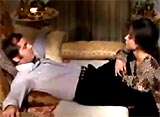
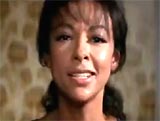
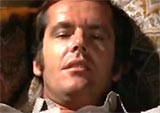
|
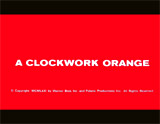
|
A
Clockwork Orange (1971, UK)
Screenwriter(s): Stanley Kubrick
 "There
Was Me, that is Alex" Voice-Over "There
Was Me, that is Alex" Voice-Over
Play clip (excerpt): 
Smirking punker Alex de Large's (Malcolm McDowell)
voice-over introductory speech in the Korova Milk Bar with
his droog friends - accompanied by Walter Carlos' synthesized
version of Purcell's Elegy for the Death of Queen Mary:
There was me, that is Alex, and my three
droogs, that is Pete, Georgie, and Dim, and we sat in the
Korova Milkbar trying to make up our rassoodocks what to
do with the evening. The Korova milkbar sold milk-plus,
milk plus vellocet or synthemesc or drencrom, which is
what we were drinking. This would sharpen you up and make
you ready for a bit of the old ultra-violence...
|
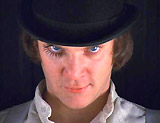
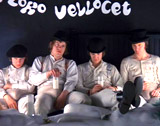
|

|
A
Clockwork Orange (1971)
Screenwriter(s): Stanley Kubrick
 Thoughts
on Aversion Therapy Treatment Thoughts
on Aversion Therapy Treatment
Alex's description of aversion
therapy treatment with 'viddy films' (videos of sexual violence)
with his eyes propped open during behavior modification:
And viddy films, I would. Where I was taken
to, brothers, was like no sinny I ever viddied before.
I was bound up in a straitjacket and my gulliver was strapped
to a headrest with like wires running away from it. Then
they clamped like lidlocks on my eyes so that I could not
shut them no matter how hard I tried. It seemed a bit crazy
to me, but I let them get on with what they wanted to get
on with. If I was to be a free young malchick again in
a fortnight's time, I would put up with much in the meantime,
O my brothers. So far, the first film was a very good,
professional piece of sinny, like it was done in Hollywood.
The sounds were real horrorshow. You could slooshy the
screams and moans very realistic, and you could even get
the heavy breathing and panting of the tolchocking malchicks
at the same time. And then, what do you know, soon our
dear old friend, the red, red vino on tap, the same in
all places like it's put out by the same big firm, began
to flow. It was beautiful.
It's funny how the colors of the real world
only seem really real when you viddy them on the screen.
Now all the time I was watching this, I was beginning to
get very aware of like not feeling all that well, and this
I put down to all the rich food and vitamins, but I tried
to forget this, concentrating on the next film which jumped
right away on a young devotchka who was being given the old
in-out, in-out first by one malchick, then another, then
another...When it came to the sixth or seventh malchick,
leering and smecking and then going into it, I began to feel
really sick. But I could not shut my glazzies. And even if
I tried to move my glazz-balls about, I still could not get
out of the line of fire of this picture.
|
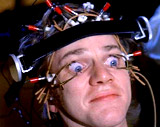
|
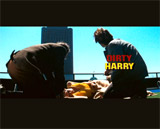
|
Dirty
Harry (1971)
Screenwriter(s): Harry Julian Fink, Rita M. Fink, Dean Riesner, John
Milius (uncredited)
 Taunting
a Downed Bank Robber Taunting
a Downed Bank Robber

Play clip (excerpt): 
Harry Callahan's (Clint Eastwood) taunting of
a wounded black criminal-bank robber ( (Albert Popwell) on
the ground, who thought about reaching for a gun on the sidewalk,
but then had second thoughts:
I know what you're thinkin'. Did he fire
six shots or only five? Well, to tell you the truth, in
all this excitement, I've kinda lost track myself. But
being as this is a .44 Magnum, the most powerful handgun
in the world, and would blow your head clean off, you've
got to ask yourself one question: 'Do I feel lucky?' Well,
do ya punk?
(Harry picked up the gun)
Bank robber: "Hey, I gots to know."
(He pulled the trigger toward the bank robber's head,
but it clicked empty. Harry chuckled.)
|

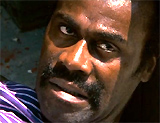
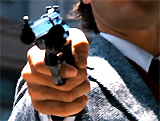

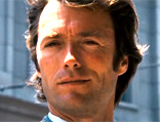
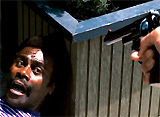
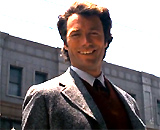
|
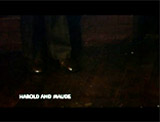
|
Harold and Maude
(1971)
Screenwriter(s): Colin Higgins
 An
Overbearing Match-Making Mother Completing a Computer Dating
Service Questionnaire For Her Son An
Overbearing Match-Making Mother Completing a Computer Dating
Service Questionnaire For Her Son
Play clip (excerpt): 
19 year-old Harold's (Bud Cort) over-bearing, match-making
mother Mrs. Chasen (Vivian Pickles) filled out his computer dating
service questionnaire for him (she never let him answer a single
question!), while he prepared to commit fake suicide. He calmly
loaded a revolver and shot himself in front of her:
First, here is the personality interview
which you are to fill out and return. Now then, are you ready,
Harold? Here is the first question. 'Are you uncomfortable
meeting new people?' Well, I think that's a yes, don't you
agree, Harold? 'Should sex education be taught outside the
home?' Oh, I would say no, wouldn't you, Harold? Yeah, we'll
give a D there. Three: 'Should women run for president of the
United States?' I don't see why not. Absolutely yes. 'Do you
remember jokes and take pleasure in relating them to others?'
Well, you don't do that, do you, Harold? No. Absolutely not.
'Do you often get the feeling that perhaps life isn't worth
living?' Hmm, what is it, Harold? A? B? Oh, we'll put C - not
sure. 'Is the subject of sex being overexploited by our mass
media?' Well, that would have to be yes, wouldn't it? 'Is it
difficult for you to accept criticism?' No. We'll mark D. 'Do
you sometimes have headaches or backaches after a difficult
day?' Yes, I do indeed. 'Do you go to sleep easily?' I'd say
so. 'Do you believe in capital punishment for murder?' Oh,
yes, I do indeed. 'In your opinion, are social affairs usually
a waste of time?' Heavens, no! 'Can God influence our lives?'
Oh, yes, absolutely yes. 'Does your personal religion or philosophy
include a life after death?' (Harold points his gun at his mother)
Oh, yes, indeed. That's absolutely. 'Did you enjoy life when
you were a child?' Oh, yes, you were a wonderful baby, Harold.
'Do you think the sexual revolution has gone too far?' It certainly
has. 'Do you find the idea of wife-swapping distasteful?' I
even find the question distasteful. 'Do you...' (gunshot) Harold,
please! 'Do you have ups and downs without obvious reason?'
Oh, that's you, Harold!
|
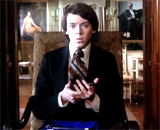
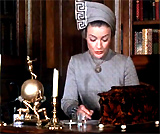
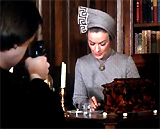
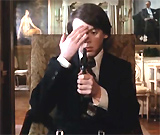
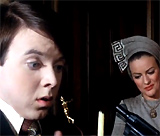
|

|
Harold and Maude
(1971)
Screenwriter(s): Colin Higgins
 A
Recommendation For Serving in the Army - "That's What
This Country Needs - More Nathan Hales" A
Recommendation For Serving in the Army - "That's What
This Country Needs - More Nathan Hales"
Death-obsessed young Harold (Bud Cort) was urged
by his domineering mother (Vivian Pickles) to have a talk with
hawkish, crazed, one-armed Uncle Victor (Charles Tyner), "General
MacArthur's right-hand man," who recommended that he sign
up for Army boot camp immediately, to "take on a man's
job":
Well, what do you say, Harold? Ah, it's a
great life. There's action, adventure, advising, and you'll
get a chance to see the war first-hand. And there are plenty
of slant-eyed girls. I'll make a man out of you, Harold.
You'll travel the world, put on a uniform, and take on
a man's job. You'll walk tall, with a glint in your eye
and a spring in your step, and the knowledge in your heart
that you are working for peace and are serving your country,
just like Nathan Hale. Now, that's what this country needs
- more Nathan Hales. (He saluted a picture of Nathan
Hale) And, Harold, I think I can see a little Nathan
Hale in you.
|
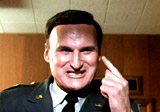
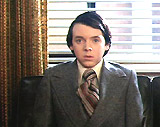
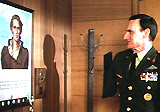
|

|
Harold and Maude
(1971)
Screenwriter(s): Colin Higgins
 A
Warning About Having Sex With the Elderly A
Warning About Having Sex With the Elderly
Play clip (excerpt): 
Young Harold (Bud Cort) was counseled by a priest
(Eric Christmas) to steer away from having sex with life-affirming,
79 year-old Maude (Ruth Gordon), in a hilarious shot sequence
(as the camera slowly panned toward his anxious, disgusted,
trembling face):
I would be remiss in my duty if I did
not tell you that the idea of intercourse: and the
fact of your firm, young body co-mingling with the withered
flesh, sagging breasts and flabby buttocks, makes me want
to vomit.
|
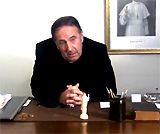
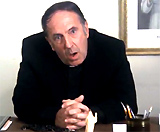

|

|
The Hospital
(1971)
Screenwriter(s): Paddy Chayefsky
 A
Monologue on Impotence A
Monologue on Impotence
In this dark comedy, Dr. Herbert Bock (George
C. Scott), Chief of Medicine in a large Manhattan hospital,
was being seduced in his office by 25 year-old, pretty hippie
Barbara Drummond (Diana Rigg), daughter of one of the patients.
She told him candidly that she had a
"thing about middle-aged men." He ranted about his
own impotence and discussed the loss of his sole purpose in life:
You're wasting your time. I've been impotent
for years. (Barbara: "Rubbish") What the hell
is wrong with being impotent? Kids are more hung up on
sex than the Victorians. I got a son, 23 years old. I threw
him out of the house last year. Pietistic little humbug.
He preached universal love, and he despised everyone. Had
a blanket contempt for the middle class, even its decencies.
He detested my mother because she had a petit bourgeois
pride in her son, the doctor. I cannot tell you how brutishly
he ignored that rather good lady. When she died, he didn't
even come to the funeral. He felt the chapel service was
an hypocrisy.
He told me his generation didn't live with
lies. I said, 'Listen, everybody lives with lies.' I-I grabbed
him by his poncho and I dragged him the length of our seven-room,
despicably affluent, middle-class apartment, and I flung
him - out! I haven't seen him since. You know what he said
to me? He's standing there on the landing, you know, on the
verge of tears. He shrieked at me: 'You old fink. You can't
even get it up anymore.' That was it, you see. That was his
real revolution. It wasn't racism, the oppressed poor, or
the war in Vietnam. No, the ultimate American societal sickness
was a limp dingus.
My God. If there is a despised, misunderstood
minority in this country, it is us poor, impotent bastards.
Well, I'm impotent, and I'm proud of it. Impotence is beautiful,
baby! POWER TO THE IMPOTENT! RIGHT ON, BABY!...You know,
when I say impotent, I don't mean merely limp. Disagreeable
as it may be for a woman, a man may lust for other things,
something a little less transient than an erection. A sense
of permanent worth. That's what medicine was to me, my reason
for being.
You know, Miss Drummond, when I was 34, I presented
a paper before the annual convention of the Society of Clinical
Investigation that pioneered the whole goddamn field of lmmunology.
A breakthrough. I'm in all the textbooks. I happen to be
an eminent man, Miss Drummond. You know something else, Miss
Drummond? I don't give a goddamn. When I say impotent, I
mean I've lost even my desire to work. That's a hell of a
lot more primal passion than sex. I've lost my reason for
being. My purpose. The only thing I ever truly loved. Well,
it is all rubbish, isn't it?
I mean, transplants, anti-bodies. We manufacture
genes. We can produce birth ecto-genetically. We can practically
clone people like carrots, and half the kids in this ghetto
haven't even been inoculated for polio! We have established
the most enormous, medical entity ever conceived and people
are sicker than ever! WE CURE NOTHING! WE HEAL NOTHING! The
whole goddamn wretched world is strangulating in front of
our eyes. That's what I mean when I say impotent. You don't
know what the hell I'm talking about, do you?...I'm tired.
I'm very tired, Miss Drummond. And I hurt. And I've got nothing
going for me anymore. Can you understand that?...And you
also understand that the only admissible matter left is death.
He blew up at her when she clinically analyzed
him as having a "familiar case of morbid menopause. It's
hard for me to take your despair seriously, doctor. You obviously
enjoy it so much." He yelled at her: "Bugger off!
That's all I need now is clinical insight. Some cockamamie
25 year-old acidhead is gonna reassure me about the menopause
now!" |
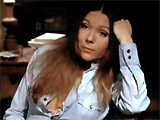


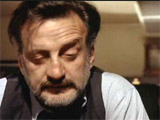
|
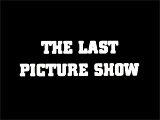
|
The
Last Picture Show (1971)
Screenwriter(s): Larry McMurtry, Peter Bogdanovich
 Nostalgia
for the Old Times Nostalgia
for the Old Times
The fishing scene of ex-cowboy Sam the Lion's
(Best Supporting Actor winner Ben Johnson) nostalgic memories
at the tank dam as the clouds shed interesting shadows on the
overcast day, when he talked longingly about the idyllic
"old times." The owner of the local pool hall
delivered a monologue to Sonny (Timothy Bottoms) - he remembered
a "crazy" youthful romance with a girl who swam nude
with him in the water:
You wouldn't believe how this country's changed.
First time I seen it, there wasn't a mesquite tree on it,
or a prickly pear neither. I used to own this land, you
know. First time I watered a horse at this tank was more
than forty years ago. I reckon the reason why I always
drag you out here is probably I'm just as sentimental as
the next fella when it comes to old times. Old times. I
brought a young lady swimmin' out here once, more than
20 years ago. Was after my wife had lost her mind and my
boys was dead. Me and this young lady was pretty wild,
I guess. In pretty deep. We used to come out here on horseback
and go swimmin' without no bathing suits. One day, she
wanted to swim the horses across this tank. Kind of a crazy
thing to do, but we done it anyway. She bet me a silver
dollar she could beat me across. She did. This old horse
I was ridin' didn't want to take the water. But she was
always lookin' for somethin' to do like that. Somethin'
wild. I'll bet she's still got that silver dollar....Oh,
she growed up. She was just a girl then, really...
At the end of the monologue, he explained why
he didn't marry her:
She was already married. Her and
her husband was young and miserable with one another like so
many young married folks are. I thought they'd change with
some age, but it didn't turn out that way.
He concluded
that marriages were often miserable and failed: ("About
eighty percent of the time, I guess"), and also lamented
the coming of old age:
If she was here, I'd probably
be just as crazy now as I was then in about five minutes. Ain't
that ridiculous? Naw, it ain't really. 'Cause bein' crazy 'bout
a woman like her's always the right thing to do. Bein' a decrepit
old bag of bones - that's what's ridiculous - gettin' old.
|

|

|
The
Last Picture Show (1971)
Screenwriter(s): Larry McMurtry, Peter
Bogdanovich
 Opposite
Reactions Opposite
Reactions
Play clip (excerpt): 
Ruth Popper's (Best Supporting Actress winner
Cloris Leachman) explosive tirade at Sonny (Timothy Bottoms)
in her kitchen (with the TV blaring) after months of neglect:
What am I doing apologizin' to you? Why
am I always apologizin' to you, ya little bastard? Three
months I been apologizing to you, without you even bein'
here. I haven't done anything wrong - why can't I quit
apologizin'? You're the one oughta be sorry. I wouldn't
still be in my bathrobe if it hadn't been for you. I'da
had my clothes on hours ago. You're the one made me quit
carin' if I got dressed or not. I guess just because your
friend got killed you want me to forget what you did and
make it all right. I'm not sorry for you. You'd've left
Billy, too, just like you left me. I bet you left him plenty
a nights, whenever Jacy whistled. I wouldn't treat a dog
that way. I guess you thought I was so old and ugly you
didn't owe me any explanation. You didn't need to be careful
of me. There wasn't anythin' I could do about you and her
- why should you be careful of me? You didn't love me.
Look at me. Can't you even look at me? Y'see? You shouldn't
have come here. I'm around that corner now. You've ruined
it and it's lost completely. Just your needing me won't
make it come back.
The scene ended with her forgiveness for him: "Never
you mind, honey, never you mind." |
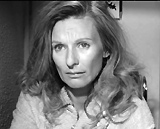
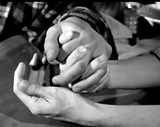

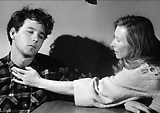
|

|
Willy
Wonka & the Chocolate Factory (1971)
Screenwriter(s): Roald Dahl, David Seltzer (uncredited)
 "You
Lose! Good day, Sir!" Speech "You
Lose! Good day, Sir!" Speech
Willy Wonka's (Gene Wilder) harsh dismissal of
Grandpa Joe (Jack Albertson) and Charlie Bucket (Peter Ostrum)
when they asked about his lifetime's supply of chocolate prize,
and he angrily told them their contest contract was voided
by their careless actions and violation of the fine print and
the rules:
Wrong, sir! Wrong! Under section 37-B of
the contract signed by him, it states quite clearly that
all offers shall become null and void if - and you can
read it for yourself in this photostatic copy - 'I, the
undersigned, shall forfeit all rights, privileges, and
licenses herein and herein contained', et cetera, et cetera...'Fax mentis
incendium gloria cultum', et cetera, et cetera...'Memo
bis punitor delicatum!'' It's all there! Black and
white! Clear as crystal! You stole Fizzy-Lifting drinks!
You bumped into the ceiling which now has to be washed
and sterilized. So you get NOTHING! You lose!
Good day, sir!
(Grandpa Joe: "You're a crook! You're a cheat and a
swindler, that's what you are. How can you do a thing like
this?! Build up a little boy's hopes and then smash all his
dreams to pieces? You're an inhuman monster!")
Sir, I said, 'Good day!'
When Charlie gave Wonka
the candy he was instructed to steal by competitor Slugworth
(Günter Meisner) (Slugworth was revealed to be Mr. Wilkinson,
a Wonka employee who was used to test Charlie's honesty), Wonka
reversed his decision, calling Charlie "My boy," and
telling him: "You won! You did it! You did it!" because
of his honesty. Charlie was awarded the "grand and glorious
jackpot" -- the chocolate factory and the entire business.
But Willy further cautioned the boy, with the
film's last line:
But Charlie, don't forget what happened
to the man who suddenly got everything he always wanted...
He lived happily ever after.
|
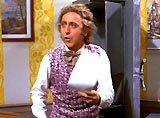
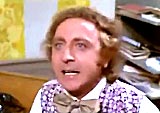
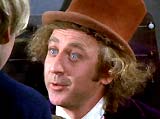
|
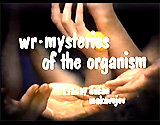
|
WR - Mysteries
of the Organism (1971, Yugoslavia/W.Germ.) (aka W.R. - Misterije
Organizma)
Screenwriter: Dusan Makavejev
 "We
must allow FREE LOVE!" "We
must allow FREE LOVE!"
Yugoslavian director Dušan Makavejev's controversial,
X-rated, montage-filled, avante-garde work was a documentary-fiction
film (dubbed a "sex film" in the countercultural era
of the early 1970s).
The main character, Milena (Milena Dravić)
- a beautiful, young red-haired Belgrade, Yugoslavian working
class female - and an assistant beautician, was a newly-freed
feminist and an enthusiastic follower of psychologist Wilhelm
Reich who mostly preached defiantly about the advocacy of free
love, but was also curious about sex.
At one point, Milena emerged onto her outside 3rd
floor porch and lectured to fellow communal apartment dwellers
within the courtyard, while her sex obsessed roommate Jagoda
(Jagoda Kaloper) was having sexual intercourse all over their
apartment with her boyfriend Ljuba (Dragoljub Ivkov) who served
in the Yugoslav People's Army.
The theme of her radical speech was
that there was an obvious linkage between state repression and
sexual neurosis. She preached the virtues of orgasmic liberation,
free love, enlightenment, and power to encourage true revolution:
Sex writers foolishly debate which are better:
short thick ones or long thin ones. I say it's a false dilemma.
You can't trust the media. Joy is what counts. A joyful one is
best. Any child must know what's sweetest: The crotch! Our road
to the future must be life-positive. Comrades! Between Socialism
and physical love there can be no conflict. Socialism must not
exclude human pleasure from its program. The October Revolution
was ruined when it rejected Free Love....Frustrate the young
sexually and they'll recklessly take to other illicit thrills:
Pilfering, burglary and assorted crimes, knifings, alcoholism,
political riots with flags flying, battling the police like pre-war
Communists! What we need is a free youth in a crime-free world!
If we are to achieve this, we must allow FREE LOVE!...
There's your class-structured society. Males
stop being men and turn into common swine!...Idiocy is the
right word for your condition. You're resigned to your social
and sexual misery!...You beasts! You screw drunken whores in
toilets! You're under-payed! Your wives and children have no
respect for you f--kless fools! You've taught your children
that sex-play will rot their spines!...
No excitement can ever equal the elemental force
of the orgasm. That's why politics attract those of us whose
orgasm is sub-standard, defective, disturbed or premature...
Shame on you! That's your problem! Real men know how to live
their lives without asking anyone's permission. Sweet oblivion
is the masses' demand! Deprive them of free love, and they'll
seize everything else! That led to Revolution. It led to Fascism
and Doomsday. "HOW MAN BECAME A GIANT" --- "DEUTSCHLAND
UBER ALLES!" The goose-stepping, mass-marching orgasm!
The bloodstream orgasm of the alcoholic, or the junkie! The
cerebral orgasm of dogmatists or religious mystics! The muscular
orgasm of compulsive workers, athletes and artists!
Deprive youth of their right to the sweet electricity
of sex and you rob them of their mental health! Children and
youth are entitled to the happiness of the genital embrace!
Back to our own, our true human nature! Restore to every individual
the right TO LOVE! Freedom for the individual is freedom for
all!"
Some of her listeners joined her in forming a dance
line around the apartment's 3rd floor terrace - while repeating
her words in song. |
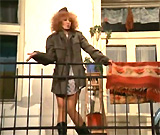

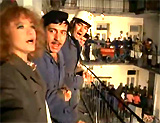
|
